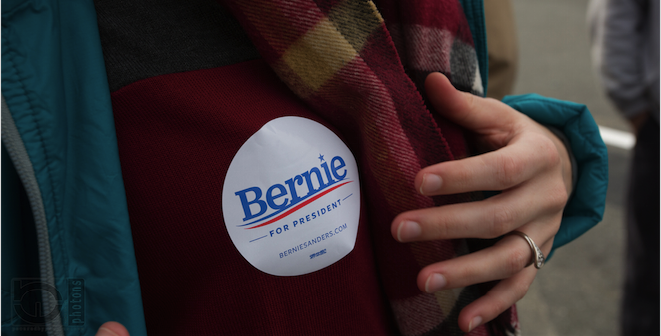“The Boys are with Bernie”: The New Hampshire Primary

The recent New Hampshire primary reveals a rise in Bernie Sanders’ popularity among new demographics. With growing numbers of young people and females supporting him, Bernie is becoming increasingly well-placed against Hillary Clinton.
Early last century the German sociologist Werner Sombart wrote a fascinating book on the subject Why is There no Socialism in America? Covered therein were many radical socialist groupings, such as the Industrial Workers of the World and more moderate socialists. These included the Socialist Party, some of whom became mayors in 79 cities across 24 states in 1912.
Yet Sombart’s fundamental exploration involved the many reasons – from American self-belief in progress and forthcoming riches to immigrant abandoning of European political dichotomies – why a major social democratic party had not arisen from American soil. His was a story of American exceptionalism but not the slap-on-your-back exceptionalism of “the indispensable nation” embraced by the American Establishment.
Fast forward to the 1970s and beyond and we again see socialist mayors in cities like Madison, Wisconsin, Santa Cruz, California and Burlington, Vermont. Historically, Vermont is Republican terrain but a post-1960s influx of counter-culturalists – the most prominent being ice cream vendors Ben and Jerry’s – helped change the political texture of the state. Thus it was that Bernie Sanders became mayor of Burlington and subsequently a congressional representative for Vermont (an independent who caucused with the Democrats until joining the Party last year).
Now he has become the first avowed socialist to win a primary contest in American history. Moreover, this was not a mere win but also a decesive win over the chosen one, Hillary Clinton. A victory of 22 percent in New Hampshire represents a surge for Sanders that has rocked the Clinton machine. If you add that to the widespread speculation suggesting Sanders won the majority Democrat vote in Iowa even though it did not translate into a caucus victory, then the political earthquake registers even stronger.
The most surprising thing about this – apart from the fact that a democratic socialist has emerged as a viable candidate on the national stage – is that his following is so strong amongst younger voters. The very idea that a vast majority of young women (statistics range from 70 to 90 percent) would reject the high profile female Democrat candidate in favour of an older male rival with a modest political profile would have been seen as preposterous a year ago. Feminist icon Gloria Steinem struggled to explain it and resorted to words she later regretted: ‘When you’re young you’re thinking, “Where are the boys?” The boys are with Bernie.’
The political insensitivity of the remark is astonishing and has, if anything, strengthened the resolve of younger women (and we are dealing up to the age of 34) to stick with Sanders. Bernie promised a revolution against the” fat cats of Wall Street” and against the political campaign financing endorsed by the Supreme Court’s Citizens United decision. This would be a revolution against the 1 percent or the .01 percent who control the wealth of the country, and against unnecessary wars. The young like what they hear and their elders are drawn to it also. This places Sanders in strong contrast, both politically and ethically, with Clinton.
Yes, Hillary Clinton won New Hampshire in 2008 only to be swept away by Barack Obama. The same could happen here, as Sanders has yet to find sure footing amongst black and Hispanic voters. Blacks, in particular, see Clinton as their preferred candidate. Yet as African-American scholar Michelle Alexander has argued, she has not earned their vote at all by fighting around issues such as extraordinarily high incarceration rates and socio-economic neoliberal policies that have kept them downtrodden.
For the Republican establishment the primary was something of a nightmare also. Trump cruised to victory over the motley crew arrayed against him. Marco Rubio was relegated to fifth, having stumbled badly in a battle with Chris Christie during the primary debate. Christie’s victory was pyrrhic as he, along with Carly Fiorina, has withdrawn from the race.
The evangelical base that was there for Cruz in Ohio is not present in New Hampshire, yet in coming a respectable third he is well placed for the approaching primaries where the Tea Party vote is stronger. Unless someone hitherto uncommitted like Michael Bloomberg steps in, it is looking increasingly like a contest between Trump and Cruz. While Ohio Governor John Kasich came second he lacks strong voter appeal nationally. Nonetheless, there are commentators like Thomas Edsall who consider Cruz a simple ideological gift to the Democrats.
It’s Even Worse Than it Looks was the provocative main title of a book by Thomas Mann from the Brookings Institution and Norman Ornstein from the American Enterprise Institute in 2013. This argued that the Republican Party had effectively divorced itself from the soul of American politics by embracing ideological extremes, rejecting compromise, questioning the legitimacy of the political opposition and ignoring basic facts and science. It had, in short, become “an insurgent outlier”.
For all his idiosyncrasies and even concern over issues like the role of big money in politics, Trump fits the bill of “an insurgent outlier”. The same can be said for Cruz, albeit in more conventional ways. It is therefore possible, despite being somewhat unwise in these volatile conditions, to predict a Cruz victory in South Carolina (with its evangelical core), followed by Trump in Nevada (Viva Las Vegas!).
The momentum established by Bernie Sanders makes predictions regarding the Democrats riskier. Clinton, at this stage, is perhaps most likely to succeed in both and go on to victory in Super Tuesday. Yet younger Democrats and also those somewhat more challenged by age, whether male or female, black or white, might just show us, yet again, that it is not just the boys with Bernie.
Anthony Ashbolt is Senior Lecturer in Politics and International Studies at the University of Wollongong. He is also the author of A Cultural History of the Radical Sixties in the San Francisco Bay Area. This article can be republished with attribution under a Creative Commons licence.





